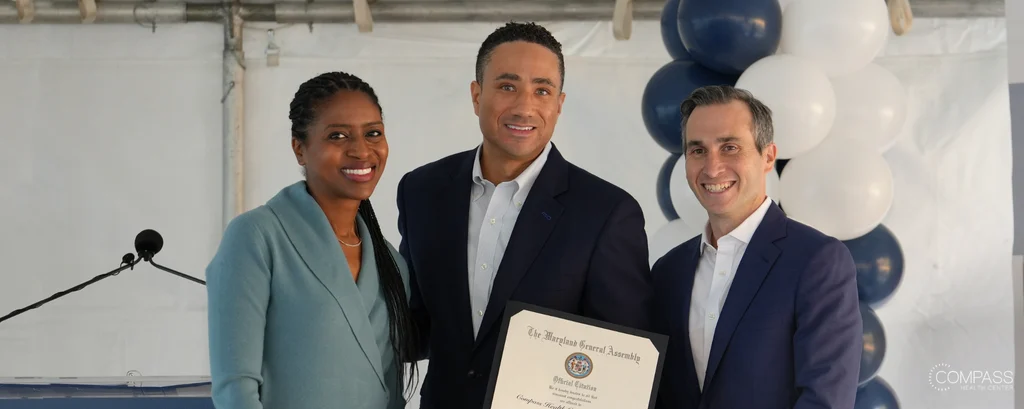Anxiety is the most common mental health concern for children living in the United States. According to the CDC, approximately 4.4 million children aged 4 to 17 years old are diagnosed with anxiety.
Nick Hatzis, MD, Medical Director of Child and Adolescent Programs at Compass Health Center Chicago, completed his Psychiatry Residency at McGaw Medical Center of Northwestern University and has been specializing in Child and Adolescent Psychiatry for 12 years. Dr. Hatzis works mainly on treating mood disorders, ADHD, and anxiety.
In this blog, Dr. Hatzis talks about his career thus far and provides some advice for any parents whose kids may be struggling with anxiety.
Tell us about your professional background
I graduated from medical school at Rush University in Chicago, IL, in 2006 and then went on to do my psychiatry residency at McGaw Medical Center of Northwestern University from 2006 to 2009. After residency, I completed the Child and Adolescent Psychiatry Fellowship at Children’s Memorial Hospital also in Chicago, IL, from 2009 to 2011.
Why did you choose to get into this field?
As I moved from rotation to rotation in medical school, I kept running into patients who had mental health problems. Those people always seemed to draw me in; I was curious about them and how carrying some of these issues through life affected them and their families.
What is your specialty?
Child and Adolescent Psychiatry. And within that, I’d say I do the most work in ADHD, mood, and anxiety.
What does a typical day look like for you?
In a way, there is no such thing as a typical day.
I’m up early, maybe finish some notes, do a little yoga—in a manner that if you saw me do it, you might cringe. Then, I come into work, take a look at who is here and prioritize their needs, complete rounds with teams, see those patients in our PHP program, talk to parents, collaborate with other doctors and nurse practitioners, and see those patients in our evening IOP program,
When my day at work is done, I head home, hang out with the family, maybe read or watch something, and then go to sleep. Rinse and repeat!
What is your favorite aspect of this line of work?
Teams. I like collaborating with other professionals and parents. I like hearing how our family therapists or individual therapists might be looking at a situation. I also like forming teams with the families of our patients.
When it comes to mental health, what conversations or topics need to be discussed more openly, and more broadly?
Well, stigma is always an issue. I think we need to be more open to talking about mental health as health. This includes what can we do that is preventative, and how do we support others when they are having episodes of depression, anxiety, or whatnot.
What are the indications that an individual should consider enrolling in a mental health treatment program?
I would say you enroll when your mental health prevents you from leading a meaningful life for yourself. You stop going to school because you are too anxious, you stop being with friends or singing or playing a sport because you have no motivation or you have daily thoughts about being not good enough, without value or worth, and when these types of problems affect your relationships with others.
How can a friend, employer, or loved one support an individual that is suffering from mental health challenges?
Well, sometimes we need to just be present and start from a position of kindness. That might mean a ton of work on our own to affect regulation and communication. It’s easy to be kind to people when they are well, it can be hard when they are struggling. See if you can help figure out their goals and the role you play in that goal. Check in with them and be open to hearing that they are not doing well, because getting better usually takes time.
In order to achieve long-term and sustainable results, what are the key factors that an individual, and their inner circle, must remain focused on?
There was an old movie called Action Jackson. Therapy does not happen really in my office. Therapy is the action that occurs in the individual’s world and primarily by the individual, but this will always occur in the setting of our relationships with others. So I think the key factors are the actions one takes to achieve goals.
Of course, one has to set reasonable, achievable goals in their own mental health care. As part of those goals, I think one should think about their values and commit to actions that support those values. They have to be aware there will be gains and losses, setbacks. They have to think about their network of support—who do they get support from, how can they access that support, and how they can accept that help. Then lastly, focus on forgiveness and self-compassion.
What does being a Compass Health Center team member mean to you?
Compass Health Center is probably the most exciting place I have worked in a long time. Being on this team gives me a sense of meaning and purpose. Every day actually can be quite different and not always predictable, so providing support to others is very important and remembering to honor their roles in our mission is critical. It means respect and compassion.
What makes the patient experience at Compass Health Center unique?
I think there is a tremendous welcoming and engagement with patients. We help individuals craft goals for themselves and their families right at the outset, helping them stay focused with a bit of an onslaught of support. The group therapists teach skills and form relationships in service of the goals. The doctor or nurse practitioner, the teacher, the individual therapist, and the family therapist also all form relationships in the service of the goals. And we are all in it together with the patient. There are also a gazillion ways the team communicates with each other; individuals who have the patience to come together as a team to assess and address problems.
Child and Adolescent Anxiety Treatment Programs
Compass Health Center helps children and adolescents work through their anxiety and other mood disorders through short-term, intensive Partial Hospitalization (PHP) and Intensive Outpatient (IOP) treatment programs. If you want to learn more about our PHP/IOP programs and find out if one would be the right fit for your child, please contact us today.


